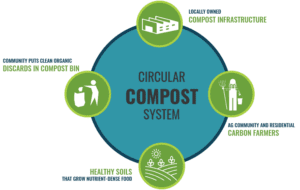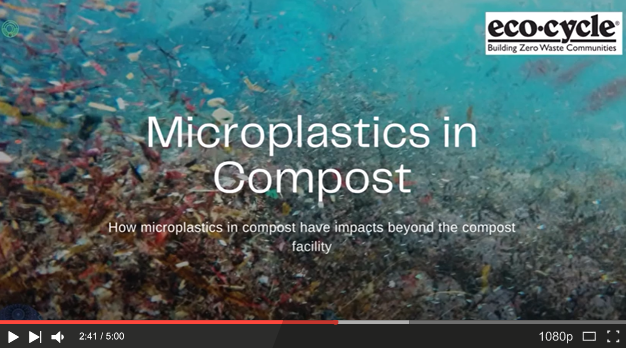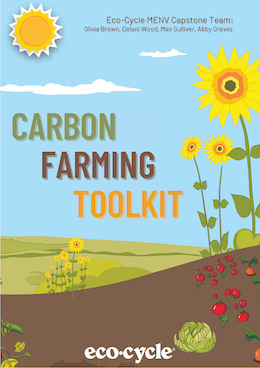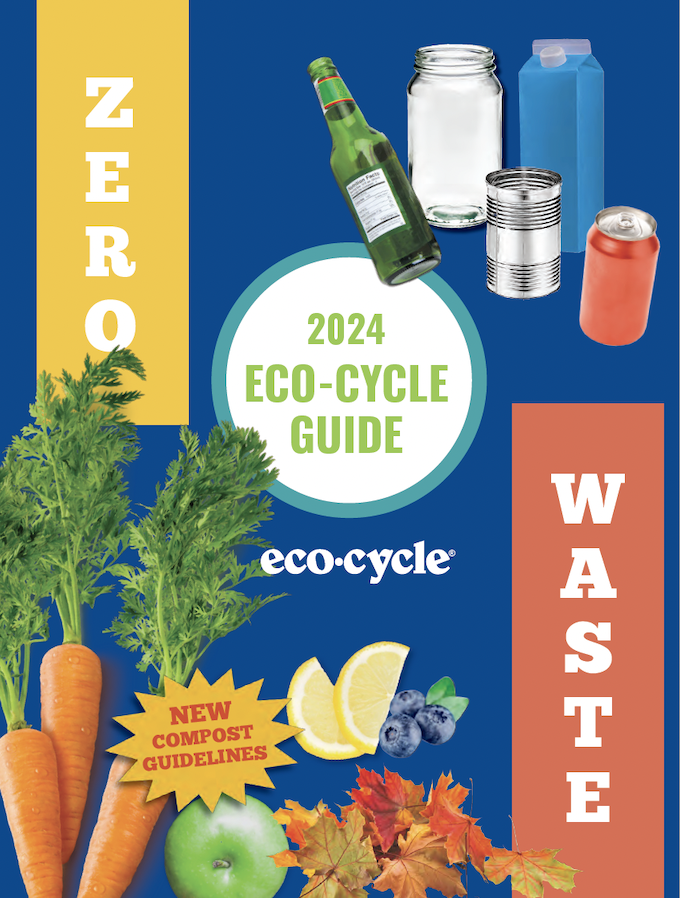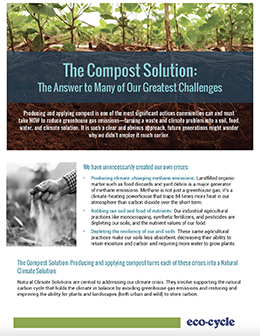Compost is a priority for climate, soil health, and water conservation.
Eco-Cycle’s compost program mission is to demonstrate and promote composting and carbon farming as a critical climate solution by developing a comprehensive Circular Community Compost System in Boulder County to serve as a model, and contribute to a robust statewide compost system across Colorado.
Eco-Cycle has identified this as one of our priorities because it is one of the most significant actions communities can and must take NOW to reduce greenhouse gas emissions, and turn a waste and climate problem into a soil, food, water, and climate solution.
Creating a Circular Community Compost System in Boulder County is a climate solution:
- Landfilled food and yard waste is a major generator of methane emissions. Methane is not just a greenhouse gas; it’s a climate-heating powerhouse that traps 84 times more heat in our atmosphere than carbon dioxide over the short term. Keeping organics out of the landfill prevents these emissions. Local compost infrastructure would improve access to affordable collection of compostable materials, which is expected to increase the amount of organic material diverted from the landfill by 44%.
- Using that finished compost on agricultural and urban lands can increase the ability of healthy soils and plants to pull even more carbon dioxide out of the atmosphere—REVERSING climate change. It’s called “carbon farming.”
For the potential of carbon farming on agricultural and urban lands to be fully realized, we must create a model Community Compost System based on Circular Economy principles that engages every sector of a community to:
- Generate clean organic discards for composting. We are committed to helping Boulder County residents and businesses understand that their organic discards become the very compost THEY can use on their own growing spaces, so making sure they provide only the good stuff (food and yard debris) and NONE of the bad stuff (plastic, aluminum, Styrofoam, etc.) will be key to a successful system.
- Build local compost infrastructure. Boulder County is committed to composting, with many communities within the county providing compost collection services, but emission-spewing trucks are now traveling 100 miles round-trip to the nearest compost facility. The goal of establishing a new facility within the county is to cut those transportation emissions to a fraction and to make local compost available to farmers and residents.
- Use compost on agricultural and urban lands to build soil, save water, sequester carbon, and build community resilience to climate change. For farming to be part of the climate solution we desperately need, new models are necessary—ones that reward farmers for building soil. We need to make compost available to “carbon farmers” (and backyard gardeners) at a cost that is competitive with their cost to spread synthetic fertilizers.
How a Local, Community-Owned Facility Helps Boulder County Reach Its Zero Waste Goals
In 2001 (funded by a tax passed in 1994), Boulder County built its own recycling facility to help the community reach its recycling goals. It’s time to do the same to help us reach our compost goals. More than 40% of the waste stream from county residents and businesses is compostable. According to an analysis done as part of the county’s evaluation process, the proximity of this site and the expected resulting cost savings for generators and haulers will attract an additional 18,500 tons of organic waste that is currently going to the landfill. This represents a 44% increase over the roughly 42,000 tons currently collected.
Demonstrating a Distributed Composting System
Composting is not about waste management or making discards “go away”—it’s about recognizing that organic materials like food scraps and yard trimmings are valuable resources essential for land regeneration. By keeping these resources close to home, we can support local farms, grow healthier food, and rebuild degraded topsoil that helps draw down carbon from the atmosphere.
Eco-Cycle envisions a distributed compost system that connects all sectors of the community to local regenerative farmers to create compost tailored to their needs. Through our Farmer First pilot, we’re showing what’s possible when a community works together to restore the soil beneath our feet.
- Discover Eco-Cycle’s Farmer First Compost Program, which partners with local schools, restaurants, and businesses to collect organic discards. These valuable materials are then composted and used by regenerative farmers—helping build healthy soils, grow more nutritious food, and sequester carbon from the atmosphere.
Join us!
There are many ways you can be part of this important work!
- Support the program: Eco-Cycle needs funding for equipment procurement, training, permitting, and education. Reach out to Anna Leske, Sr. Advancement Officer, at [email protected] to learn more about supporting this program, or donate online.
- Provide an on-farm location: Would you like to be one of our farm partners creating compost on-site? Join our program!
- Host a presentation: Are you part of a community group? We’ll come share the vision of our community-based, distributed composting system with you.
- Participate in the next phase of our carbon farming campaign: Eco-Cycle is using compost and other regenerative farming practices to sequester carbon while also planting trees to build the urban canopy (particularly in Boulder, which has been hard-hit by emerald ash borer), and support pollinator gardens. Learn more about the Cool Boulder Campaign and sign up!
- Create a carbon farming campaign in your community! Use our toolkit developed from our three-year urban lands carbon farming pilot.
























